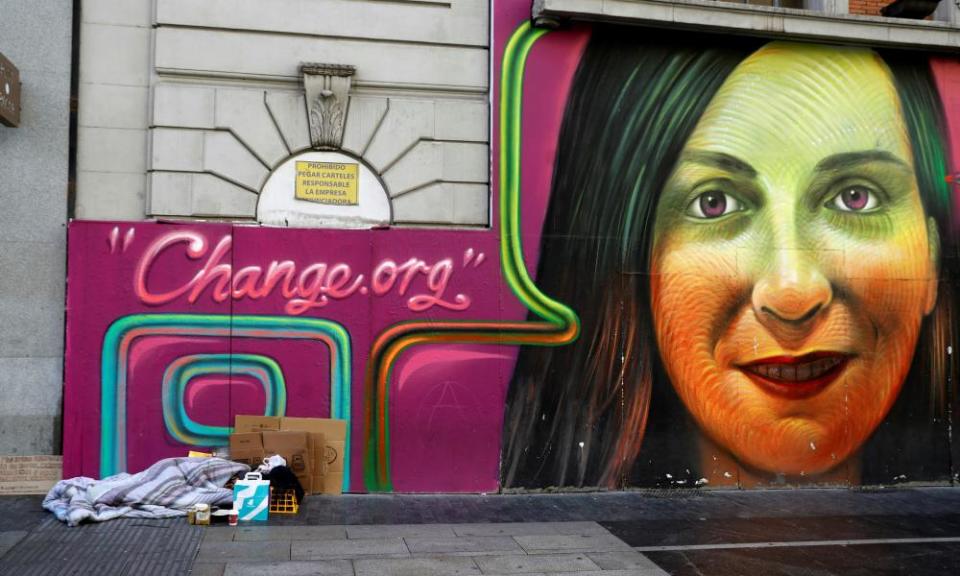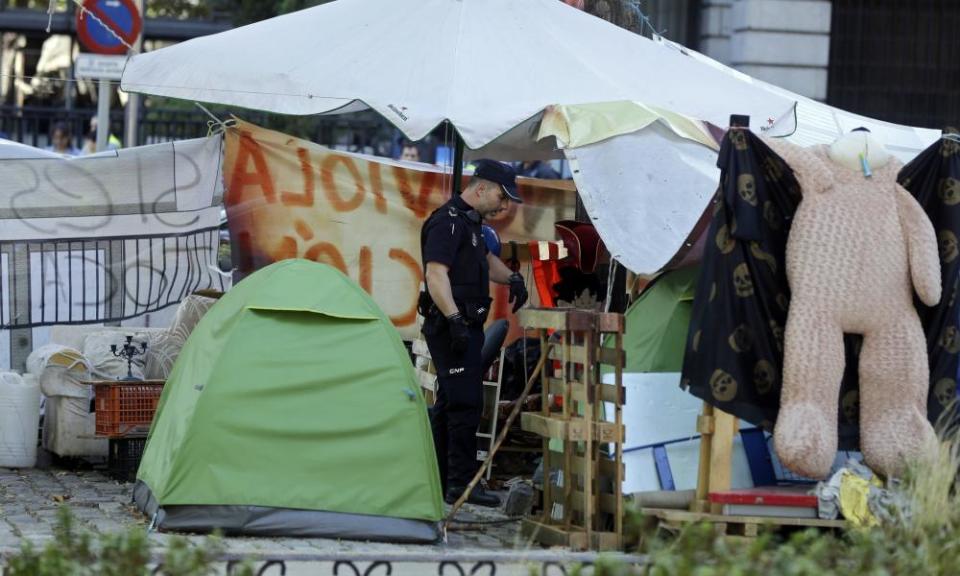'This is meant to be a caring country?': refugees battle the cold in Madrid
On Monday night, a group of newcomers to Madrid put their children to bed. In the absence of a roof, walls or mattresses, they wrapped them in blankets and tucked them into open suitcases to guard against the cold of the streets.
Had it not been for the intervention of a neighbourhood volunteer network who paid for a hostel, the two families who had fled violence in their home country of El Salvador would have spent the whole night outside the city’s overwhelmed emergency shelter coordination centre.
As temperatures in the Spanish capital plummet, rain falls and the city prepares to host next month’s UN climate summit, authorities are unable to provide basic shelter and protection to dozens of migrants and asylum seekers, including children. The number of people arriving in the Madrid region to seek asylum has almost doubled over the past year, rising from 20,700 to 41,000.
The Salvadoran families ended up sleeping on the floor of a church in the south of the city where volunteers have spent the last 25 years working with immigrants, refugees, young people and people with drug problems. On Wednesday night alone, the centre fed and sheltered two dozen men, women and children from Venezuela, El Salvador, Colombia and Yemen.
“We know that this isn’t our country and we can’t expect anything but I just felt sad when we ended up on the street,” said one Salvadoran woman, who would not give her name for fear of reprisals from the criminal gangs that drove her family overseas.

Another Salvadoran woman had brought her two children to Spain after the gang demanding money from the family gave them an ultimatum: “The money you don’t pay us is the money you use to bury your children.”
She said they had spent much of the money they had on searching for accommodation as far away as Ávila, a 90-minute bus ride from Madrid. “We’ve found some wonderful people here, who’ve been so helpful, but I just don’t understand how this is meant to be a caring country, judging by all this,” she said.
Related: El Salvador: a nation held hostage – a photo essay
They are among the luckier ones. A small camp has sprung up outside the Samur emergency shelter headquarters, where, cocooned in anoraks and sleeping bags, a handful of young Venezuelans were waiting for somewhere warm and dry to sleep. “Come into the living room,” said one, pointing to the pile of cardboard and blankets that covered the pavement.
Daniel Pérez, 29, who used to earn his living repairing medical equipment in a town close to the border with Colombia, said he was applying for asylum despite the improvised accommodation. “We were in the Red Cross shelter for a few days but we’ve been camping here for three days,” he said. “The first night was really difficult because we had nothing and it was -1C – we’re not used to such cold.”
Like all the migrants and refugees the Guardian spoke to, Pérez and his friends had been overwhelmed by the kindness of local people, who had been handing out blankets, buying them food and making them soup.
And no matter how cold it got, said Pérez, he would rather be on the streets of Madrid than back in his troubled country. “This generation of Venezuelans just can bear it any longer,” he said. “We realised that we’re not trees, rooted to the spot, and that we can move away. We’ll get through this because it’s still better to be here than in Venezuela. All this is just temporary.”
Javier Baeza, the priest who runs the San Carlos Borromeo parish centre that took in the Salvadorans, teases and jokes with his guests. But he is deeply angry over the lack of care and has reported the protection failure to the public ombudsman.
“People come here and they’re disappointed because they think the image of a country with basic human rights is real and they’re profoundly mistreated,” he said.
“I don’t think it’s a capacity problem – the problem is the lack of political will at every level. There’s no political will from the government for immigrants to be looked after properly, the Madrid regional government isn’t doing anything at all, and Madrid city council doesn’t have the will to help 100 people in one of the world’s greatest capitals.”
On Thursday, the conservative mayor of Madrid, José Luis Martínez-Almeida, wrote to Spain’s acting prime minister – the Socialist leader, Pedro Sánchez – claiming that central government’s inaction had triggered the collapse of an already overstretched system.
The mayor also asked Sánchez to find 1,300 emergency places to help guarantee refugees were treated with dignity and respect. The government, however, insists the council needs to do more to deal with the emergency.
Consuelo Rumí, Spain’s secretary of state for migration, said other major Spanish cities such as Barcelona managed to allocate sufficient resources to vulnerable arrivals, adding that it was Madrid city council’s responsibility to help those currently on the streets.
“Madrid city council, which serves a population of 4 million people, just can’t have so few resources on the street,” she said. “Until someone has actually formalised their asylum application, they’re someone who’s on the street and who needs to be looked after by the city council. They just can’t have such scant resources on the street, especially at this time of year.”

A spokeswoman for the regional government said it was a matter for the central government and the city council.
Ana Zamora, a volunteer with the Red Solidaria de Acogida (Solidarity Welcome Network), which has been working to help people find shelter, said “totally ineffective management” meant the relevant authorities were failing in their basic duty of care.
“The people sleeping rough are all seeking international protection and none of them is getting the help to which, in theory, they’re entitled,” she said. “These people have no other option – they’ve spent all their money on getting here and they have no more.”
While the political squabbles continued, one of the Salvadoran mothers sat crying in a parish 5,000 miles (8,000km) from home, thinking about the church where her family used to worship, where they would donate food and toys to the poor.
“My daughter is confused by all this and she asked if we were poor now,” she said. “We’re not asking for luxury, we’re not even asking for comfort. We came to Spain because we’d been told we would be protected here.”
Migration in Spain
Sánchez won huge plaudits in June last year after one of his first acts in office was to announce that the country would take in the 630 migrants and refugees stranded onboard the rescue ship Aquarius.
Sánchez said Spain had a duty to help avert a humanitarian catastrophe while his foreign minister, Josep Borrell, called for an end to “ostrich politics” when it came to the issue of migration.
In 2018, 56,480 migrants and refugees reached Spain by sea, with 769 people dying in the attempt. The record number of arrivals to Spain, partly driven by the closure of other European routes, placed huge strain on the country’s reception infrastructure.
It was also seized on by conservative and far-right parties who sought to make it a political issue. The far-right, anti-immigration Vox party, which won 52 seats in this month’s general election, has accused unaccompanied foreign children of being “a serious problem in our neighbourhoods”.
Its messages are a far cry from those of the former Madrid mayor Manuela Carmena, whose administration famously hung a banner on city hall reading: “Refugees welcome.”
Vox’s leader, Santiago Abascal, said this week the party was looking into the possibility of abandoning the landmark UN convention on the rights of the child so that Spain would be able to deport all irregular immigrants regardless of their age.

 Yahoo News
Yahoo News 
